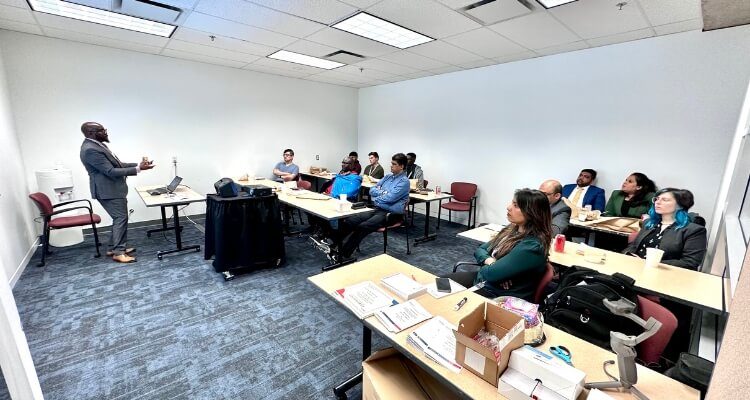In today’s society, where awareness and understanding of autism spectrum disorder (ASD) are constantly growing, the significance of autism conferences cannot be overstated. But why are autism conferences important?
Autism conferences are crucial for encouraging the community, sharing knowledge, and exploring advancements in research and therapies. Families and individuals impacted by autism gain support and empowerment through these events.
As we explore the importance of these gatherings and how they make the autism community more informed and inclusive, read the entire article.
What Is the Autism Spectrum Disorder (ASD)?
Autism Spectrum Disorder (ASD) is a complex neurodevelopmental condition that affects social interaction, communication, interests, and behavior. The term “spectrum” in ASD highlights that the disorder manifests in various forms and degrees of severity, making each individual’s autism experience unique.

Characteristics of ASD may include challenges with social communication, such as difficulty understanding social cues and maintaining conversations. Individuals may also exhibit restricted or repetitive patterns of behavior or interests.
The causes of autism are not fully understood, but they involve a combination of genetic and environmental factors. Early diagnosis and special interventions can significantly improve the quality of life for those on the spectrum by supporting developmental and educational needs.
What Does Autism Conference Mean?
Autism conferences are gatherings where experts, caregivers, individuals on the spectrum, and advocates come together to share knowledge, research findings, and support strategies. These events provide a platform for discussing various aspects of autism and disability studies.
Topics at autism conferences range from early intervention to education and employment. Understanding the significance of these conferences helps highlight their core purpose. Through workshops, presentations, and panel discussions, attendees explore the latest autism research, therapies, and strategies. A global conference on autism and disability studies aims to encourage collaboration and promote greater understanding.
Attending an international conference on autism and disability studies offers valuable networking opportunities, enabling you to connect with peers, professionals, and service providers from around the world. It also provides a space to exchange ideas, resources, and experiences, fostering a sense of community and mutual support.
Why Are Autism Conferences Important?
Autism conferences play a crucial role in advancing understanding, support, and advocacy for individuals on the autism spectrum. They serve as a platform for sharing knowledge, research, and best practices within the autism community, including insights on upcoming autism conferences that explore the latest trends and developments in the field. Attending these events can significantly enhance collaboration and promote innovative solutions for those affected by autism.
Knowledge Sharing
Autism conferences bring together experts, researchers, caregivers, and individuals with autism to exchange insights and expertise. Attending autism conferences arranged by well-known autism event organizers will help you learn about current research findings, innovative therapies, and evidence-based interventions.
Professional Development
For professionals working in fields related to autism, such as educators, therapists, and healthcare providers, conferences offer valuable opportunities for professional development. Workshops, presentations, and training sessions provide practical skills and strategies for improving support and services for individuals with autism.
Community Building
Autism conferences encourage a sense of community and belonging among attendees. Participants have the chance to connect with others who share their experiences, challenges, and successes, creating a supportive network of peers, mentors, and allies.
Advocacy and Awareness
By raising awareness about autism and promoting acceptance and inclusion, conferences contribute to advocacy efforts on both local and global scales. Through education and dialogue, these events challenge stigma, dispel myths, and promote understanding of autism as a neurodevelopmental difference rather than a disorder.
Family Support
For caregivers and families of individuals with autism, conferences offer valuable resources, information, and support. Workshops and presentations address topics such as sailing the healthcare system, accessing services, and building effective support networks.
Empowerment
Attending autism conferences can empower individuals with autism to advocate for themselves and others within their communities. By sharing their stories, insights, and perspectives, individuals on the spectrum can contribute to shaping policies, programs, and practices that better meet their needs.
Global Collaboration
Autism conferences provide opportunities for international collaboration and cooperation in addressing the global challenges and opportunities related to autism. By bringing together stakeholders from diverse backgrounds and regions, these events facilitate cross-cultural understanding and exchange of ideas.
Benefits of Attending Autism Conference
Autism conferences offer insight, support, and resources to individuals, families, and professionals. Regardless of the cost of attending an autism conference, these conferences serve as platforms for learning, networking, and advocacy within the autism community. Here we’ve discussed how autism conferences benefit you.
Knowledge Enrichment
Attending an autism conference exposes you to the latest research, therapies, and interventions. Workshops and presentations cover diverse topics, from early intervention strategies to adult life transitions, broadening your understanding of autism spectrum disorders.
Connecting with Experts
Interacting with leading experts in the field provides clarity and guidance. You can seek advice, ask questions, and gain practical tips tailored to your specific circumstances, enhancing your ability to support individuals with autism effectively.
Networking Opportunities
Conferences bring together individuals from various backgrounds and experiences. Engaging with fellow attendees stimulates connections, facilitates information exchange, and creates a supportive community where you can share challenges and successes.
Access to Resources
Exhibitions and resource fairs at conferences showcase innovative tools, technologies, and services. Exploring these resources equips you with practical solutions and introduces you to organizations dedicated to autism advocacy and support.
Empowerment and Advocacy
Participating in conferences empowers you to become a stronger advocate for yourself or your loved ones with autism. Learning about rights, policies, and inclusive practices enables you to advocate effectively within your community and beyond.
Emotional Support
Autism can be emotionally draining at times. You can gain emotional support from others who understand your challenges at conferences, where you can find solidarity, share experiences, and find solidarity.
Inspiration and Hope
Witnessing success stories and hearing from individuals on the spectrum themselves instills hope and inspiration. Conferences celebrate diversity, resilience, and the potential for individuals with autism to lead fulfilling lives, motivating you to continue your journey with renewed optimism.
Are Autism Conferences Suitable for Everyone?
Autism conferences attract a diverse range of individuals, all with a common interest in autism spectrum disorders. These events target various stakeholders within the autism community, offering something for everyone.
Parents and Caregivers
Parents and caregivers of individuals with autism form a significant portion of conference attendees. They seek information, support, and resources to better understand and assist their loved ones on the spectrum.
Educators and Professionals
Educators, therapists, and other professionals working with individuals with autism regularly attend conferences. They aim to improve their knowledge, skills and approaches to provide effective support and education.
Researchers and Academics
Researchers and academics in the field of autism spectrum disorders frequently participate in conferences. They present their latest findings, engage in discussions, and collaborate with fellow experts to advance understanding and interventions.
Individuals on the Spectrum
Autism conferences increasingly welcome individuals on the spectrum themselves. Autism events offer a platform for self-advocacy, sharing personal experiences, and contributing valuable insights to discussions about autism.
Advocates and Activists
Advocates and activists passionate about autism acceptance and inclusion are prominent conference attendees. They work to raise awareness, influence policies, and promote the rights and well-being of individuals with autism.
Government Representatives
Government representatives, policymakers, and funding agencies may attend autism conferences to stay informed about current trends, needs, and priorities within the autism community. Autism conferences play a crucial role in shaping policies and allocating resources.
Community Members
Members of the broader community, including friends, extended family members, and neighbors, also attend autism conferences. They seek to learn, offer support, and promote greater understanding and acceptance of autism in society.
Autism Conference Attending Tips
You can maximize your experience at the autism conference and come away with valuable insights and connections by following some tips and suggestions given by our experts. Here are some helpful tips for attending an autism conference.
- Set Clear Goals: Before the conference, identify what you want to achieve. Whether it’s gaining new knowledge, networking, or finding resources, having clear goals will help you stay focused.
- Bring Necessary Materials: Pack a notebook, pens, and any materials you might need, like business cards for networking. Having everything ready will help you make the most of the sessions.
- Choose Appropriate Attire: Dress appropriately and engage actively. Give importance to both female and male attire for autism conferences that follow professionalism.
- Engage with Speakers and Attendees: Don’t hesitate to ask questions during sessions. Engaging with speakers and other attendees can lead to valuable insights and connections.
- Participate in Workshops: Join smaller workshops or breakout sessions for hands-on learning. These often provide a more intimate setting for discussion and feedback.
- Take Notes: Jot down key points and takeaways from each session. This will help reinforce what you learn and provide a reference for future use.
- Follow Up After the Conference: Reach out to new contacts via email or social media. Maintaining these connections can lead to ongoing support and collaboration.
Frequently Asked Questions
People with autism can get support, understanding, and advocacy at autism conferences. The following are some frequently asked questions about why these conferences are important.
What Role Do Autism Conferences Play in Knowledge Dissemination?
Autism conferences bring together experts, caregivers, and individuals with autism to share the latest research, therapies, and interventions, advancing understanding and support for the autism community.
How Do Autism Conferences Benefit Professionals Working with Individuals with Autism?
Professionals such as educators and therapists gain valuable insights and practical skills through workshops and presentations, enhancing their ability to provide effective support and services.
Why Are Networking Opportunities at Autism Conferences Valuable?
Networking allows attendees to connect with peers, professionals, and service providers, raising a sense of community and facilitating the exchange of ideas and experiences.
How Do Autism Conferences Contribute to Advocacy Efforts?
By raising awareness, challenging stigma, and promoting acceptance and inclusion, conferences empower individuals and organizations to advocate for the rights and well-being of individuals with autism.
What Support Do Autism Conferences Offer for Families and Caregivers?
Workshops and presentations address topics such as sailing the healthcare system and building effective support networks, providing valuable resources and emotional support for families and caregivers.
Why Are Autism Conferences Empowering for Individuals on The Spectrum?
Conferences provide a platform for self-advocacy, allowing individuals on the spectrum to share their experiences, insights, and perspectives, contributing to a more inclusive and understanding society.
How Do Autism Conferences Facilitate Global Collaboration and Cooperation?
By bringing together stakeholders from diverse backgrounds and regions, conferences further cross-cultural understanding and exchange of ideas, addressing global challenges and opportunities related to autism.
Why Should Government Representatives Attend Autism Conferences?
Government representatives play a crucial role in shaping policies and allocating resources for the autism community, and attending conferences helps them stay informed about current trends and priorities.
Final Thought
The autism community depends on conferences to exchange knowledge, build community, and advocate. These gatherings bring together experts, caregivers, people on the spectrum, and advocates to share insights, research findings, and support strategies.
Attendees gain valuable resources and connections, plus workshops, presentations, and networking opportunities, improving their understanding and support of autism. In addition, autism conferences raise awareness, challenge stigma, and promote acceptance and inclusion.
They help people become stronger advocates, inspire hope, and encourage collaboration. Their main goal is to provide learning, support, and empowerment to the autism community. So, why are autism conferences important? This is because autism conferences allow autistic people to understand, support, and advocate.







